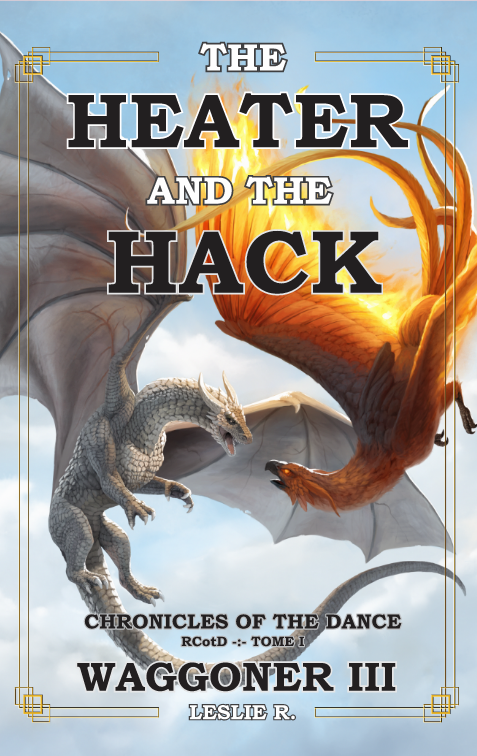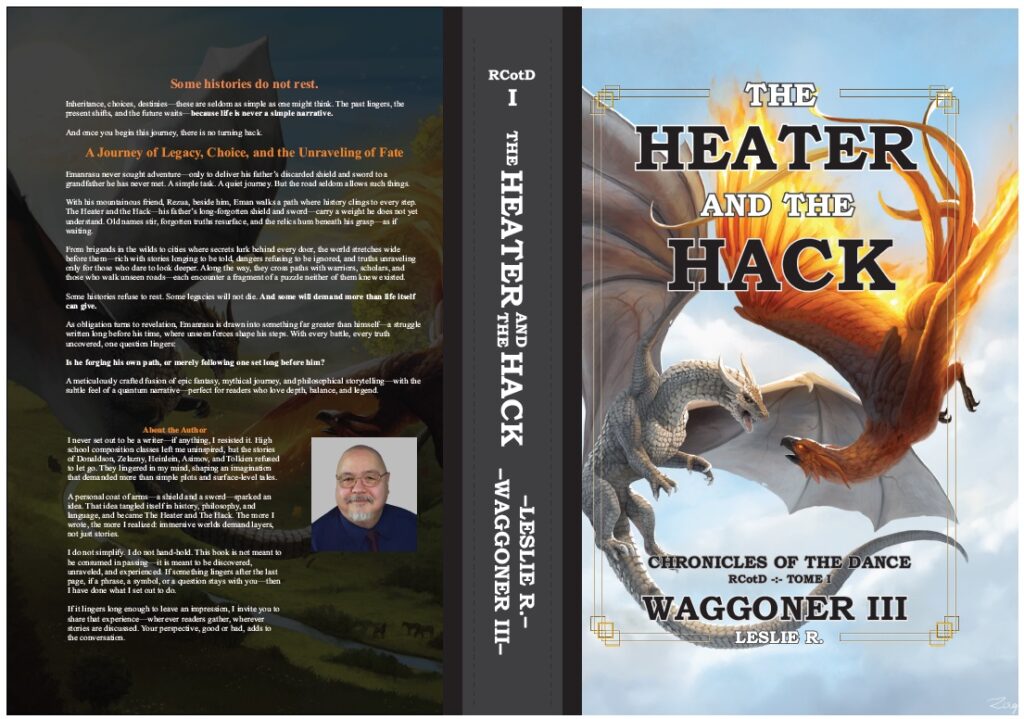The Heater and The Hack
by Leslie R. Waggoner III
Chronicles of the Dance – RCotD -:- Tome I
Genre & Reader Target Sheet
Primary Genres (Use these for submission, metadata, promotions)
- Mythopoeic Fantasy
Invented cosmology, spiritual architecture, eucatastrophe, and archetypal embodiment (Dragon, Phoenix, Tree, Sun, Sky, Earth). – Think (new) N.K. Jemisin, (old) Patricia McKillip - Epic Fantasy
Multi-character arcs, world-shaping conflict, and a central protagonist drawn into a destiny beyond himself. – Think (new) R.F. Kuang, (old) Guy Gavriel Kay - Philosophical Fantasy
Themes of cosmic balance, identity, grief, sacrifice, and legacy — explored with restraint and depth. Think (old) Gene Wolfe, (new) Neil Gaiman - Classic Fantasy
Echoes the tone and pacing of Tolkien and Zelazny rather than modern, trope-heavy fantasy. Think (old) J.R.R. Tolkien, (new) Susanna Clarke
Secondary Themes & Features
- Slow-burn / Literary Fantasy
Deep introspection, symbolic pacing, and prose that favors atmosphere over action. - Character-Driven
Transformation > plot twists. Emotionally earned arcs and meaningful deaths. - Fantasy with Spiritual Undertones
Not religious, but cosmologically rooted. Death, rebirth, and purpose are woven into the metaphysics of the Dance. - Constructed Language
Hadokai Tubatonona — complete with glyphic script, typable font, and meaning tied to Balance.
Ideal Reader Profile
- Loves Tolkien, Le Guin, Wolfe, or Herbert
- Interested in philosophy through fiction
- Seeks meaning over magic systems
- Drawn to stories that feel timeless, even ancient
- Enjoys discovering symbolic truth slowly
- Not afraid to feel when characters fall — or rise again
Market Performance (Kindle Give away)
- #1 in Classic Fantasy eBooks
- #2 in Epic Fantasy (Kindle Store)
- #5 in Sword & Sorcery Fantasy eBooks
- (via free Kindle promotions)
No publisher. No agent. No algorithmic push.
This was earned through readers who felt the Dance.
Key Review Quote (AI Literary Evaluation)
“Not just another fantasy novel — this is a myth in disguise. One that doesn’t entertain, but reveals. Mythopoeic, timeless, and emotionally earned.”
—Emily, Book Detective
🔗 Author Website & Links
Reviews: Amazon Reviews
The Heater and The Hack – A Legacy Written in Steel, a Fate Tangled in Shadow
Website: leswaggoner.com
Amazon: The Heater and The Hack
Some histories refuse to rest. Some legacies demand more than life itself.
Emanrasu never sought adventure. He only meant to deliver his father’s discarded shield and sword to a grandfather he had never met—to be rid of them, to be free.

But the past does not let go so easily.
With his towering friend, Rezua, beside him, Emanrasu walks a road where history clings like mist and forgotten names whisper from the shadows. The Heater and The Hack—mere heirlooms, or something more?
From cliffs where ancient truths lie buried to wild lands haunted by myth, his errand twists into something vast and inescapable. A scholar burdened with silence. A mentor who speaks in riddles. A path written long before his birth—one that will not wait for him to decide whether he wishes to play his part.
Not all legends are chosen. Some must be unraveled, one careful step at a time.
Whispers tell of the Black and cosmic forces tied to human representatives. Balance holds against Chaos. Order moves in shadow. As friendships deepen and blood stains the road, Emanrasu must face the truth: Is fate a prison, or is legend forged by those who dare to shape it?
This is not a tale that hands you answers—it rewards those who seek.
For those who crave intricate worlds, where meaning unfolds in layers, where each revelation redefines all that came before, this is the first step into an epic where every answer births a deeper mystery, and the echoes of the past shape the battles yet to come.
For readers who still walk the old roads of fantasy, who hear the hush of Moorcock’s eternal struggle, the pulse of Leiber’s camaraderie, and the keen weight of McCaffrey’s burdens—or those who have followed shifting realities where gods play dice and fate is always a step ahead, as Zelazny once taught us—this is a tale not of destiny alone, but the choices that make it so.
When all roads meet at the crossroads of Le Guin and Piers Anthony, where steel sings of history and choice, the path forward is never written in hope—only taken in expectation.
When comparing first published works—it has been said “The Heater and The Hack” rivals Wolfe in labyrinthine subtlety, Le Guin in mythic resonance, Zelazny in cosmic scope and character poise, and the underpinnings even rival Tolkien himself in depth of worldbuilding and linguistic integration.
By the end of “The Heater and The Hack” Can you prove them wrong?

Genre Alignment
🧙♂️ 1. Epic Fantasy
✔️ Multi-layered world
✔️ Grand-scale conflict
✔️ Archetypal forces at play
✔️ A chosen (but reluctant) protagonist
✔️ Long-form quest + existential stakes
🌿 2. Classic Fantasy
✔️ Rooted in Tolkien-era storytelling structures
✔️ Prose and pacing that echo older literary tradition
✔️ A reverent tone rather than ironic or edgy
✔️ Minimal influence from post-2000 fantasy trends
🔮 3. Mythopoeic Fantasy (your crown genre)
✔️ Original cosmology (the Dance)
✔️ Spiritual themes and symbolic characters
✔️ Constructed language and glyph system
✔️ Characters = living mythic embodiments
✔️ Ending is a true eucatastrophe
📖 4. Philosophical Fantasy
✔️ Meditations on balance, fate, identity, and grief
✔️ Non-utilitarian magic (symbol > function)
✔️ Dialogue and narration that wrestle with meaning, not mechanics
💔 5. Character-Driven Fantasy
✔️ Deep introspection (Emanrasu)
✔️ Real emotional stakes
✔️ Transformation over triumph
✔️ Intimate interpersonal development (Serrah, Rezua, Telk)
🔡 6. Linguistic/Constructed Language Fantasy
✔️ Hadokai Tubatonona as a structured system
✔️ Custom font & writing representation
✔️ Language is tied to metaphysics (balance itself)
📜 7. Fantasy with Spiritual/Religious Undertones
✔️ Not dogmatic, but existential
✔️ Vision quests, cosmic visions, death/rebirth motifs
✔️ The Tree, the Sun, the Phoenix — symbolic theology
🧩 8. Slow-Burn or Literary Fantasy
✔️ Focus on interiority and atmosphere
✔️ Symbolic over action-heavy
✔️ Demands patience and reflection from the reader
✔️ Language with weight and rhythm
⚔️ 9. Sword & Soul (in spirit)
✔️ Not grimdark — but earnest, values-driven heroism
✔️ Characters wrestle with internal, not just external, enemies
✔️ Celebrates honor, legacy, grief, and truth over power
10 Best Author Matches Across All Categories
1. Guy Gavriel Kay
- Match: Prose style, mythic resonance, grief/legacy themes, multi-character arcs.
- Why: Kay’s Tigana and The Fionavar Tapestry blend myth, philosophy, and emotional intimacy much like your novel.
2. Gene Wolfe
- Match: Philosophical density, allegory, layered structure, unreliable/semi-hidden narrators.
- Why: Like Wolfe’s Book of the New Sun, your book rewards close readers, conceals RCotD’s identity, and emphasizes symbolic over literal.
3. Patricia McKillip
- Match: Lyrical prose, mythopoeic imagery, archetypal embodiment, romantic undercurrents.
- Why: McKillip’s Riddle-Master Trilogy shares your atmosphere and symbolic myth layering.
4. Stephen R. Donaldson
- Match: Reluctant hero, psychological depth, grief/legacy, dense prose.
- Why: Covenant’s arc (broken, guilty, drawn into destiny) parallels Emanrasu’s reluctance and burden.
5. J.R.R. Tolkien
- Match: Mythopoeic cosmology, invented languages, archetypal embodiment, eucatastrophe.
- Why: Your Dance cosmology mirrors Tolkien’s Silmarillion-style myth structure.
6. Roger Zelazny
- Match: Archetypes, mythic-symbolic tone, classic fantasy pacing, existential undertones.
- Why: Zelazny’s Chronicles of Amber balances myth with personality, like your blending of Emanrasu/Serrah/Tarlis with the Dance.
7. Susanna Clarke
- Match: Lyrical density, slow-burn narrative, myth layered into personal character arcs.
- Why: Jonathan Strange & Mr Norrell and Piranesi echo your contemplative pacing and mythic layering.
8. Kazuo Ishiguro
- Match: Philosophical restraint, grief, memory, legacy, symbolic landscapes.
- Why: The Buried Giant feels like a cousin to your tone: slow, grief-laden, allegorical.
9. N.K. Jemisin
- Match: Invented cosmology, language as worldview, grief/identity themes.
- Why: The Broken Earth integrates mythic cosmology with personal arcs in ways that mirror your world-building.
10. Mervyn Peake
- Match: Ornate style, labyrinthine subtlety, dense atmosphere, archetypal eccentricity.
- Why: Gormenghast shares your prose density and symbolic character archetypes.
Summary
If I had to pick the three strongest comps for The Heater and The Hack, I’d say:
- Kay (emotional/mythic resonance)
- Wolfe (philosophical/mythopoeic density)
- Donaldson (psychological weight, reluctant hero)
But McKillip, Tolkien, and Zelazny all give strong triangulation for tone and mythopoeia, while Clarke, Ishiguro, Jemisin, and Peake bring in more surprising but accurate alignments.